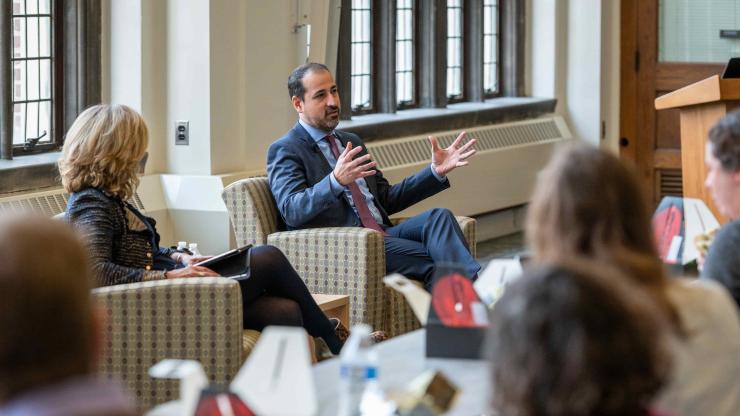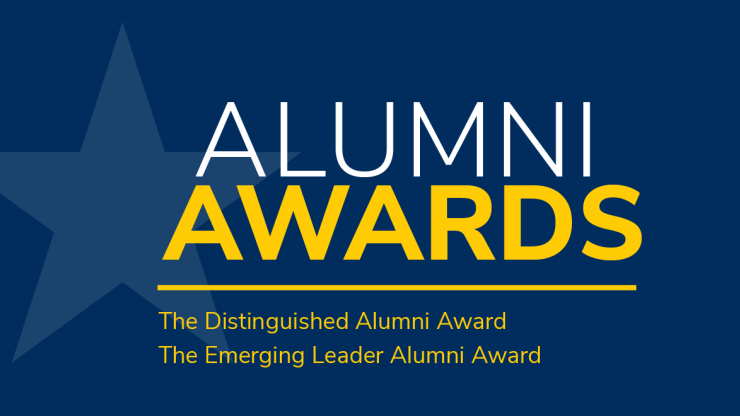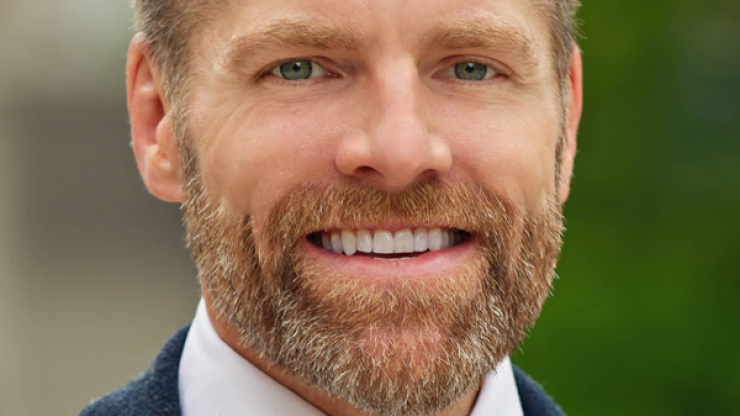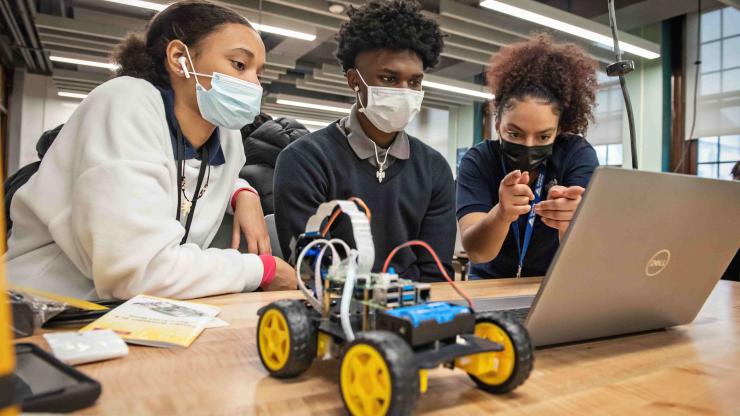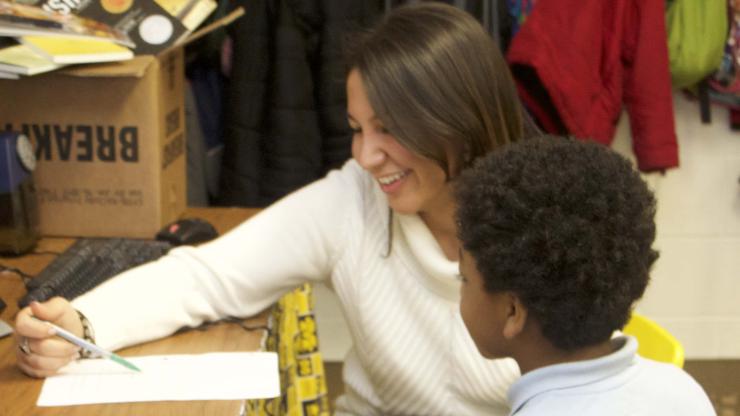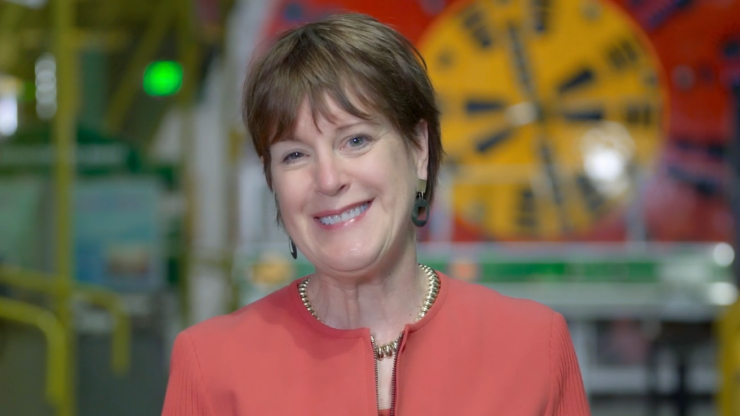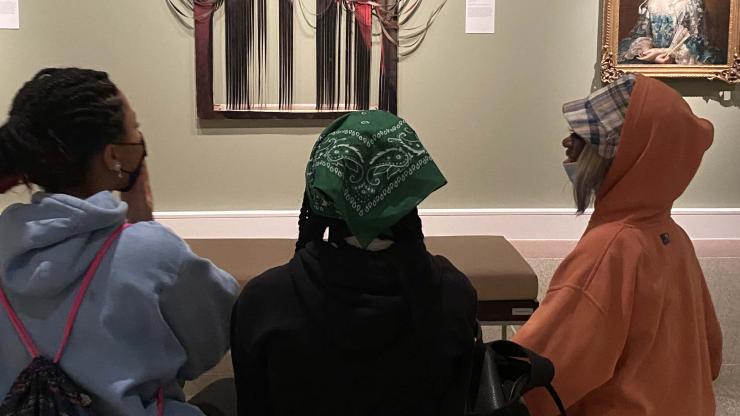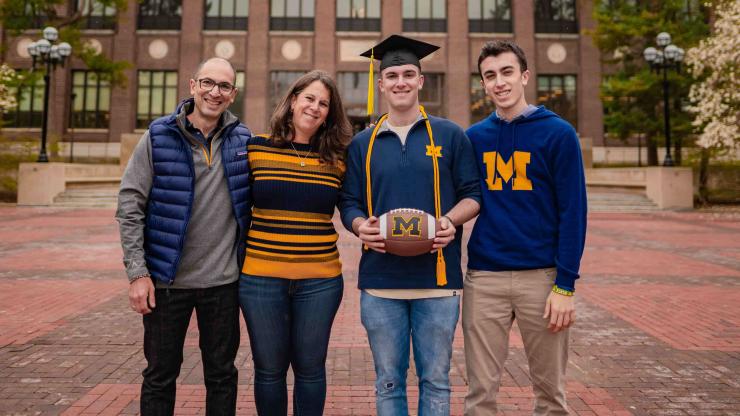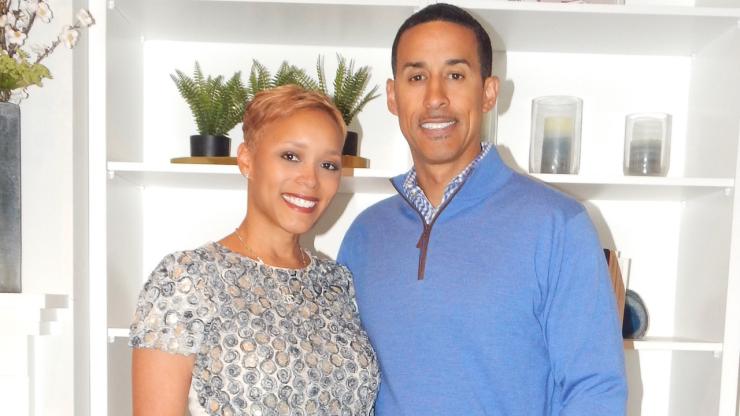Coming to a Screen Near You: The EdHub for Community and Professional Learning
The SOE launches a new center of online learning
From teaching through the pandemic, to advancing equity and inclusion, to making new and creative use of information technologies—educators in the U.S. and around the world are being tasked with adapting their practice to address the ever-evolving needs of students. In response, Don Peurach, professor of Educational Policy, Leadership, and Innovation in the SOE, says there is a strong need for public institutions like the University of Michigan to support local communities and school districts in making advances to meet the moment.
This year the SOE is launching the EdHub for Community and Professional Learning, a center of primarily online learning opportunities for families, community advocates, educators, and policymakers. The mission of the EdHub is to catalyze a global community committed to ensuring that all students experience the joy, power, and love of learning.
“We’re seizing the opportunity presented by these interacting presses on schools and districts by supporting them in addressing the needs and aspirations of students. And we’re taking it as a chance to leverage information technologies—to connect educational professionals, parents, families, community members, and other stakeholders—and collectively develop the capabilities needed to respond to the moment positively,” says Peurach.
The demand for virtual continuing education was already evident. Since its launch in 2016, the SOE’s popular MicroMasters program, Leading Educational Innovation and Improvement, has attracted tens of thousands of participants. The MicroMasters program engages learners in five online courses focused on educational innovation and improvement, with a specific focus on the principles and application of Improvement Science. These courses can be used by practicing teachers, leaders, and reformers to advance their current knowledge and earn a certificate, providing a path to an accelerated master’s degree on the UM-Ann Arbor campus. Building on the success of the MicroMasters, organizers hoped to turn their attention next to developing an online community.
In November 2020, following a charge from Dean Elizabeth Moje, a team of SOE faculty, doctoral candidates, and staff in the Center for Education Design, Evaluation, and Research (CEDER) began to think about how the SOE could serve more people through virtual learning than it has historically. Over the course of a six-month ideation phase, the team conducted market and competitor scans, design challenges, external consultations with the Center for Academic Innovation, and internal litmus tests with SOE leaders, faculty, and staff. The result was the development of a comprehensive architecture for “stackable” open-access and certificate-granting public and professional learning opportunities.
Now housed on the SOE’s website, the EdHub hosts a library of offerings. These include live and recorded virtual events, open-access courses available to the public at no cost, and certificate-granting professional development courses for educators who hold teaching certification.
The first piece of content EdHub organizers developed was in response to a request from the state of Michigan. When schools pivoted to virtual instruction in the early days of the COVID-19 pandemic, “it changed the modality for teachers and learners across the United States,” says Alison Diefenderfer, Instructional Designer for the EdHub. The shift laid bare inequities that had long existed across the educational system. In response, the SOE partnered with Michigan State University and Michigan Virtual to create a suite of free online professional development (PD) courses focused on inclusive teaching and learning. Made possible through funding from the Governor's Emergency Education Relief Fund, the PD was developed collaboratively by U-M faculty and local K-12 teachers with the aim of understanding and advancing equity in remote and hybrid learning settings arising from COVID-19. Intended to provide training on research-based practices and strategies, the four courses (Anti-Racist Trauma-Informed Practice in PreK-12 Education; Equity in Online Learning for Multilingual Students; Inquiry-Based Learning in Secondary Mathematics Education; and Inquiry-Based Learning in Secondary Science Education) each consisted of 8-10 hours of asynchronous learning for teachers. Participation was free, and Michigan educators could use the courses to earn required continuing education credits (SCECHs).
Although the suite of PDs was developed in 2021, the offerings remain accessible through Michigan Virtual’s platform, and are also available on the EdHub website. Austin Peters (AM ’21, TeachCert ’21), who was hired as an ESL teacher in the Woodhaven Brownstown School District last September, took one of the courses in January 2022. He started with the district a few weeks into the semester, and had missed some professional development hours. While searching for virtual courses to catch up on SCECHs, the equity PD caught his eye. “I happened to notice the Equity in Online Learning for Multilingual Students course in the list [of offerings] and thought that would serve me well as an ESL teacher,” he wrote to the SOE. “Quickly I recognized familiar faces on the slide presentation videos. So thanks again! It seems I still have more to learn from your classes!”
“The university as a whole is striving to be a world leader in online education,” says Peurach. “U-M has a vast alumni base. We know there are people out there who like to connect with us and stay with us. What makes us unique as a new unit in a school of education at a public university is this commitment to egalitarian imperatives. What we are going to do is reach out and encourage people to connect with us, to take up a social challenge, which is developing capabilities around the world to advance access, quality, and equity in public education.”
In the fall of 2022, the EdHub will launch “Transforming Education in an Interconnected World,” a series of MOOCs (Massive Open Online Courses) funded by the Center for Academic Innovation. The aim of the series is threefold: to draw a diverse array of educational stakeholders into community; to establish a common framework for understanding and pursuing the transformation of public education in the United States and other national contexts; and to serve both as an intellectual foundation and recruiting mechanism for continuing public and professional learning opportunities being developed and offered by the EdHub. The MOOC series will run in tandem with a “teach out-like” Community Engagement series launched in spring 2022 that shares the same three aims. Together, the MOOC series and the Community Engagement series will form what organizers call “the EdHub Backbone.”
The Community Engagement series will include town halls, policy forums, and mini-conferences. Its inaugural event took place in April 2022 when the EdHub hosted a town hall, “The Teacher Shortage in Michigan: Framing Challenges, Envisioning Solutions.” Calling together multiple perspectives including a parent organizer, a union representative, an administrator, a state legislator, and the SOE’s own Dean Moje, the panel explored how schools state- and nationwide are addressing the challenge of retaining and recruiting teachers. They also discussed the repercussions this issue presents for families and communities beyond the walls of the classroom.
After attending the town hall, Scott Cochran, an elementary school principal in Midland, MI wrote to share his appreciation. “As a current principal, former teacher, and University of Michigan graduate, I found it exciting to hear from Dr. Peurach and the other panelists regarding real, common-sense solutions to one of our most pressing current challenges in public education. I've often felt like I wanted to connect with other leaders in education who could help us address challenges, but didn't know how to make that happen.” Now the EdHub made such connections possible.
The Community Engagement series continued in May as Clinical Associate Professor Liz Kolb, along with Kristin Fontichiaro, a clinical professor in the School of Information, convened the Digital Wellness Symposium. This event, geared toward 6th, 7th, 8th graders and their parents or guardians, called together 40 pairs of two-person teams (a student plus a parent/guardian) for a morning of learning, conversation, and activities about healthy online behaviors. Convened on Zoom, this interactive community event included a keynote address by Diana Graber, author of Raising Humans in a Digital World: Helping Kids Build a Healthy Relationship with Technology, respective activities for the children and adults, as well as at-home conversation prompts and challenge activities for the pairs to complete together.
As the EdHub’s presence is built out, it will grow to offer more online, in-person, and hybrid learning experiences, attracting audiences who are committed to advancing educational access, quality, and equity in public education. The goal of the EdHub is to empower a global community of educational difference-makers with continuing education credits, certificates, and micro-credentials that recognize and elevate their capabilities to lead innovation and improvement in their classrooms, schools, districts, and communities.
“I would like to take this opportunity to thank you for designing the MicroMasters Program for us, educators all over the world, who are looking for innovation and improvement in education in the face of the rapid changes in the 21st century,” wrote Brenda Wong, a veteran history teacher in Hong Kong, via email. “Even though I'm an experienced teacher, I was so lost in the face of the ongoing online lessons caused by COVID-19 in 2020. I lost my confidence in teaching, I knew the traditional teaching pedagogy could no longer fit my kids, and I was looking for a course to advance my teaching. I searched local universities and didn't find any responsive courses focusing on ‘education innovation and improvement,’ a phrase that is not very concerned in this conservative industry (before the pandemic). At last, I found this program. I've learned so much throughout all courses.”
“The idea of providing asynchronous teaching and learning for professional development—on demand—is huge,” says Diefenderfer. She speaks from personal experience. Prior to her work as an instructional designer she taught in the virtual classroom: “A lot of my years teaching I was part-time at multiple institutions. I did my professional development whenever I could find an opportunity.” As Diefenderfer helps design the EdHub’s platform, she is thinking about the various types of learners around the world who are at different stages of their professional journey—whether they’re looking to pivot to teaching, or they’ve been working in education and seek an opportunity to advance their career, or they are parents who helped their kids learn through the pandemic, and now want to take a more active role in the field of education. “The multiple modalities of engagement, multiple types of panels and tracks and possibilities for learning sequences—that’s what I’m most excited about.”
As the EdHub launches this spring, EdHub project manager Ariel Mallett reflects on the work that has gone into making the platform’s offerings available. “It’s an iterative process. The EdHub looks very different today than it did [in its planning stage] a year ago. And it’ll look different again a year from now.” As the EdHub team collaborates with faculty who have experience in open access and online education, and professional development education, Mallett says the goal is to create a virtual experience that truly feels like the SOE.
Diefenderfer notes that every new offering—whether it’s a panel discussion, or a professional development course—affords the EdHub team an opportunity to consider how they might scale the content for future users: “You’re already building with your 2.0 or your 3.0 template in mind.” Taking audience and user feedback into consideration at every step, she says, opens up new lines of inquiry for instructional design, as well as new ways to connect with an ever-expanding audience.
“We’re seeing more and more learners engage each month,” says Diefenderfer. “The topics and themes and the types of questions that come from the audience provide opportunities for new learning nodes that may or may not have been on our radar before. Are there things we can leverage? And likewise, we may have clusters in those audiences to then engage with further.” She also notes that in designing the EdHub, the team is focused on universal design—an approach that centers accessibility for all types of learners. “We’re looking for those opportunities where we’re finding an audience, a purpose, and a possible modality for different ways of engagement.”
In a crowded virtual space, where many institutions are targeting potential users, Peurach is clear that the greatest benefit of the EdHub is its community—a roster of individuals who seek access to the resources that will further their own education to make education itself equitable.
“This movement orientation is what will distinguish us,” says Peurach. “We want to draw in other organizations that are doing similar work, with the same egalitarian commitments, and act as a connective tissue to stitch together a broad network that can support folks in learning to do this work.”
Organizers of the EdHub hope to attract a broad range of interested learners—everyone from education professors to the “education curious.” “We want people who want to run for school board, people who want to elevate their role,” says Peurach. In order to encourage and support a general public that wishes to deepen its commitment to today’s students, and help create change in public education, he says, “there need to be learning opportunities that put everybody on the same page."
